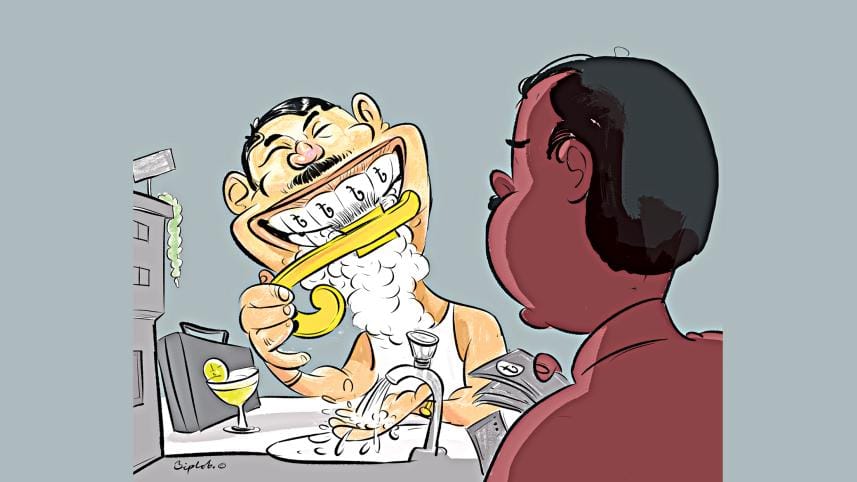Budget targets ex-citizens’ laundered assets

One of the main targets of this government is the recovery of stolen assets, or assets that have been pilfered abroad through capital flight.
Investigations by the Anti-Corruption Commission (ACC) into capital flight have uncovered the use of citizenships from other countries, often referred to as golden passports, to transfer and stash wealth abroad.
To this end, the finance adviser in his budget speech declared that Bangladeshi-origin taxpayers who have later renounced their Bangladeshi citizenship but have transferred income earned in Bangladesh abroad will be penalised.
"Persons who were originally Bangladeshi by birth but later renounced their Bangladeshi citizenship and have not properly paid taxes on income earned in Bangladesh, and have instead transferred such funds abroad by various means, will now be subject to applicable taxes and penalties on such laundered assets," Finance Adviser Salehuddin Ahmed said in his speech while delivering the proposed budget for FY26.
The speech also referred to the existing high-level task force formed by the government to implement initiatives to recover stolen or laundered assets and added that millions of crores from bank deposits have been siphoned off.
"The question arises whether this step was taken to enforce penalties on money-launderers like Mohammed Saiful Alam and others," mulled the chairperson of the ACC, Mohammad Abdul Momen.
The ACC has approved and filed multiple cases against Saiful Alam, chairperson of S Alam Group, and his wife, Farzana Parveen, accusing them of amassing approximately Tk 1,540 crore in undisclosed wealth, including properties and investments in countries such as Singapore, Cyprus, and the British Virgin Islands.
Alam acquired Singaporean citizenship in 2021 and subsequently renounced his Bangladeshi citizenship.
He has threatened legal action against the state of Bangladesh because he is now legally a "foreign investor."
This move can also be perceived as a precautionary step geared towards others who have allegedly pilfered and stashed wealth abroad.
The UK's National Crime Agency has recently frozen nine properties worth £86 million belonging to Salman F Rahman's son Ahmed Shayan Fazlur Rahman and his nephew, Ahmed Shahryar Rahman, both of whom are British.
"One of the goals of this year's budget is to ensure equitable distribution of wealth and to build a discrimination-free Bangladesh," the adviser said during the budget speech, while also pledging to root out corruption.
Real estate amnesty draws criticism
Yet, despite these pledges, the newly unveiled Finance Bill 2025 still includes provisions for whitewashing black money using real estate, albeit at a much steeper price.
For years, black-money holders could launder their money through real estate and land by paying an additional tax, with last year's tax rates for premium property going up to Tk 6,000 per square metre for real estate and Tk 15,000 per square metre for land.
This year, this amnesty will be restricted to only real estate; launderers will no longer be allowed to recycle black money using land.
In addition, the new budget makes a distinction between those choosing to launder money quickly by buying ready flats and those willing to invest in developing land.
The rates have been hiked by as much as 259 percent, with black wealth holders having to pay Tk 21,527.8 per square metre for buying ready-made flats, buildings, and apartments in prime locations like Gulshan, Banani, and Baridhara.
If they develop existing land, the additional tax per square metre will be Tk 9,687.51, a 61 percent hike from the flat rate for real estate last year.
While the percentage hike remains the same, the tax goes down depending on the area.
Additionally, while last year's budget allowed such investors indemnity from being questioned by any source, this year's budget makes no mention of that.
The budget last year also allowed this indemnity if black wealth holders paid a flat 15 percent tax on undeclared immovable properties – this year's budget skips that as well.
Additionally, black wealth holders can use this opportunity only for wealth that has not yet been flagged and investigated by tax authorities. Otherwise, penalties imposed by the latter will take precedence.
Transparency International Bangladesh slammed this move by the government, saying it would encourage corruption.
"Whatever way it may be interpreted, to undermine the core mandate of state reform in general and anti-corruption in particular, this shows how the interim government has surrendered to the real estate lobby power to facilitate corruption," said TIB Executive Director Dr Iftekharuzzaman in a press statement.
"In effect, the government is incentivising citizens to accumulate illegal and undisclosed wealth throughout the year with the assurance that such black money will be legitimised at year-end. The justification being offered – favouring the real estate sector – is deeply problematic, especially since that sector has been identified as one of the most corruption-prone in the country," he said.




 For all latest news, follow The Daily Star's Google News channel.
For all latest news, follow The Daily Star's Google News channel.
Comments